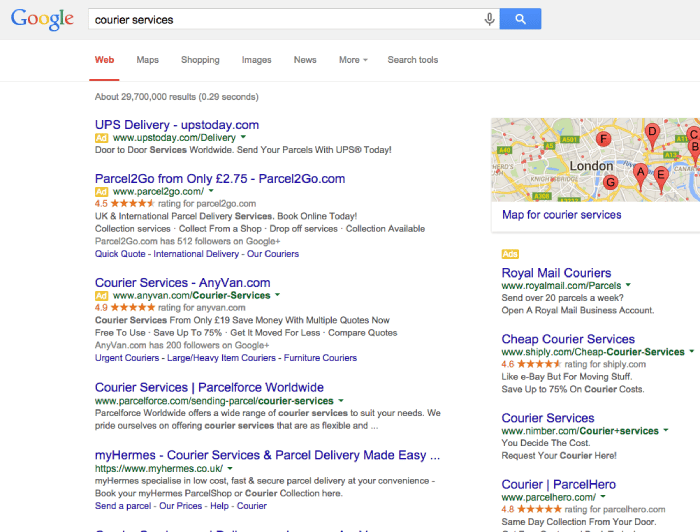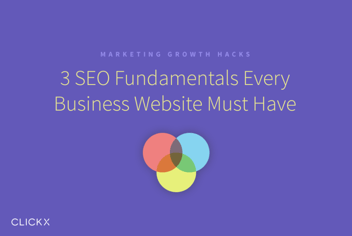3 Highly Effective SEO Tips for Competing With Big Brands
One of the cold, hard truths of SEO is that big brands have the upper hand.
Big names are so established with consumers that they regularly get searches and clicks, enabling them to sit comfortably atop search engine rankings. Worse still, big brands have big teams and budgets to throw behind marketing strategies that further boost the public’s affinity for them, solidifying their SEO even more. This creates a blockade at the top of search engines that seems impossible for a smaller business to penetrate.
However, it is entirely possible for a small business to compete against big ones, sneak under the radar and bring in some all-important customers. And we’re going to show you how.
This post will give you some tactics which you can use to make sure your business wins its very own David versus Goliath story.
1. Ensure Your Website and Brand Are Ready for Battle
It’s all well and good bringing people to your site, but if it’s confusing or unfriendly to the user, your efforts will be completely wasted.
You need to ensure that your website:
- is mobile compatible,
- is easy to navigate,
- doesn’t take ages to load, and
- has no broken links.
Believe it or not, if you do all of the above, your site will be far more appealing to Google (from this particular perspective) than many big-name competitors.
There are plenty of other key on-site SEO techniques that you can take advantage of. Utilize Google’s Webmaster Tools in order to keep a close eye on how Google is responding to the content on your site.
Bonus tip: Ensure that your visual branding is high quality and consistent throughout your site. This makes a huge difference to how customers value your business.
2. Know Your Strengths
Big brands can ride on their established reputations and don’t necessarily need to strive to make themselves stand out, but you must take every opportunity to do so.
Think about why customers should be picking your coffee shop or building services or insurance company over the big names. This may be in terms of what makes your product or service unique, or what benefits a customer can experience.
Here are some examples:
- A coffee shop that is close to the university campus and offers discounts.
- An eco-friendly delivery company.
- A restaurant with a loyalty scheme.
Once you have your unique selling point, you can use it to build your giant-slaying strategy. Encourage your customers to make noise on social media channels about your company and the service they’ve received.
3. Focus on Content Marketing
While large companies will have the money and resources to execute big marketing campaigns, these will generally take weeks to execute and involve numerous departments. The process is much different for a small business, and can be easier and more effective. Here are some important aspects of content marketing that you should be exploring:
Authority
If you create your own content—a blog, for example—that speaks with knowledge and authority to your audience, it will affirm your own brand as recognizable and trustworthy on the subject. What you have working in your favor is personability—you’re not a faceless big brand, and people are more likely to listen to your expertise because you’re an actual human.
Consider what you have to offer in terms of expertise and experience that you can use as content to bring insight to new audiences. Use your unique strengths to feed into this. Build up a content plan so that you always have new daily, or weekly reasons for people to return to your site.
Social Media
Many corporate social media accounts are closely monitored to make sure that they are ‘on brand’, which often makes them come across as very robotic or purely serving a purpose—such as responding to requests or complaints.
Small businesses have a big advantage here. While it’s important to be polite and professional to promote your business, social media is the best platform for showing your human side by being engaging and worth following. Reach out to people who fit your target market but aren’t following you yet—follow them, respond to a tweet of theirs and just generally make your presence know.
Offering a competition to your followers to get them sharing is a great way of netting more followers. Most importantly, remember to always make sure you respond to any queries in a helpful, prompt manner.
Collaboration
Big brands are always competing with one another and trying to steal each other’s customers. On a smaller scale, businesses are still competitive but generally less vicious. Use this to your advantage by collaborating on content with other small businesses that compliment your own. This could take the form of:
- guest blogging,
- linking to useful external content for your customers,
- organizing real-life events, or
- networking with contacts who will promote you.
This way, you can get your informative, authoritative content to a wider audience. You will gain those all-important links while enjoying a wider exposure among the people who are most likely to be interested in your business. These efforts will be rewarded by the search engines over time.
Bonus Tip: Explore Specific Targeting
While big brands seem to have many, long-reaching arms when it comes to marketing, there are actually many gaps in their strategies. This is where you can attack. Consider the places that your marketing can have more of an effect than a recognizable big name. Here are some examples of what you can do:
Targeted Advertising
Big brands may be able to run big advertising campaigns, but they aren’t specifically targeted at all. By exercising precise targeting when it comes to paid advertising, you do narrow down the potential audience considerably, but you’re more likely to get hits where they matter.
>The benefits of local PPC advertising are huge, and it’s never too early to begin putting together your targeting strategies. Use Google Analytics to tell you who and where you should be targeting, and you will see a much greater ROI.
Long Tail Search Terms
Using keywords is an essential part of targeting particular search terms when it comes to SEO. However, this needs to be much more considered when you’re up against big brands. This can be done by targeting longer, more specific search terms.
A standard search term such as ‘courier services’ is likely to bring up the big brands: UPS, DHL, FedEx, etc. Small, local courier businesses will have a tough time going up against these big names. Even a slightly more specific term, for example, ‘courier services Chicago’ coughs up many of the same names. However, ‘Courier services Chicago eco-friendly’ gets much more specific results and many of the big names are nowhere to be seen, because they have not focused on targeting this search term.
Think about all the specific aspects of your business that people may be searching for. This includes very specific locations, your unique selling points and any unique services that you might offer. Make sure that these feature prominently within your website, its keywords and copy.

General search terms will return general results.
Conclusion
While it can feel hopeless for a small business to go up against a big brand in the SEO ring, it’s totally possible for the small business to win and get the customers it deserves. The main things that you need to remember are:
- Keep your website and branding in shape.
- Know your strengths.
- Build on your authority through being personable.
- Target the audience that the big brands aren’t.
These are the ways to exploit the big brands’ weak spots and establish your name in the gaps in their strategies.
Have you ever done any SEO giant slaying? Let us know in the comments!



.webp?width=825&height=550&name=apple-camera-desk-office-1024x683%20(1).webp)
.webp?width=836&height=558&name=black-and-white-people-bar-men-1024x683%20(1).webp)
.webp?width=766&height=511&name=pexels-photo-8-768x512%20(1).webp)



